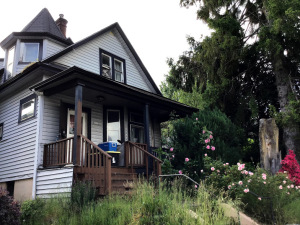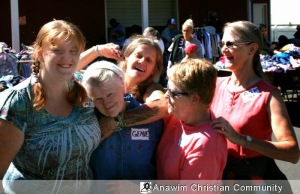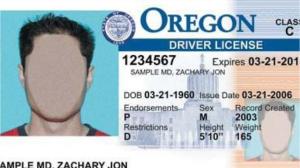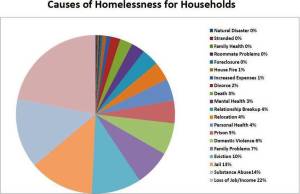-
Community House
 In 2003, Diane and I opened our home to people on the street. That wasn’t the first time we enacted this hospitality. We had folks in our two bedroom apartment with our three kids, staying in our living room for years before. And before that, we had immigrants, refugees, friends and people who just got out of prison. Bu they all stayed for a limited period of time, up to a few months, to get on their feet.
In 2003, Diane and I opened our home to people on the street. That wasn’t the first time we enacted this hospitality. We had folks in our two bedroom apartment with our three kids, staying in our living room for years before. And before that, we had immigrants, refugees, friends and people who just got out of prison. Bu they all stayed for a limited period of time, up to a few months, to get on their feet.Now we were looking for a longer term solution, to keep people until they had another viable option. Sometimes this is for a few days, but sometimes many years. To belong to our community, we asked that people attended a worship service or Bible study and that they work ten hours for the community. We would provide a room, electricity, running water, a shared kitchen and what food we were able to provide.
We all worked together, helping each other, helping others. Diane and I raise our kids in the environment of community living, homeschooling them and loving to see them live with and interact some of the poorest of the poor, as well as the unique families we had with us. It provided a unique place for them to grow up.
We’ve had kids playing in the house, people quarreling, others recovering from illness, others working together on common projects. We’ve had many jokes, many songs, many discussions, many difficulties, many friendships. All gathered together to love– although some attempts were more successful than others. And some roads to love took longer than others.
I will especially remember Vickie, who always quietly served and got along with everyone.
Byron, who would be there to comfort and to passionately declare the scriptures. Sometimes too passionately.
Tim, who was recovering from a particularly hard road on the street, and who rested and then passed away in our room.
Hammer, who came to learn how to love, and took gentle leadership in difficult situations.
Tim and Samantha, whose family grew during their stay here.
The Markoya family, whose children were a joy.
Ron, who puttered around our gardens for about a decade.
Ankles, the handyman who kept things running in an innovative, but knowledgeable manner.
Styx, who was silent and gruff until you got to know him and then he was immensely loyal.
Mark and Mary Anne who married here and whose artisan ways shaped their lives.
Dion, Pam, Bryon, Uncle Jimmy, Trucker, Half Rack, Barry and so many more.
And Mike, who was here to clean up the house for opening and is here to see the house close.
Three years ago, we told all the current inhabitants that June 2018 the house would close and that us Kimes’ weren’t going to live in community any more. We are getting ready now to prepare the house for sale, and then to move on to the next direction. This house was a dream when we started Anawim in 1996, and now that dream is behind us.
The funny thing is now the Portland city council declared our overpacked dwelling and backyard legal. They want to see more homes do what we did for a decade and a half. And I encourage others to do this as well. Jesus is out there, the stranger, waiting for someone to take him in, to give him space to live. We need to get to know him and invite him into our homes. The need is greater than ever.
-
“Are Homeless People Worthless?”
 A question I was asked to respond to. Here’s my answer:
A question I was asked to respond to. Here’s my answer:
I suppose it depends on who you ask.
Some people consider all horseless people worthless because they are either mentally ill or addicted, because otherwise they wouldn’t be on the street. Many homeless consider themselves worthless because they have failed at the basics of living in society. They see themselves and anyone else in their community on the street failures, worthless, pointless. Others look at a person on the street as disgusting, to be treated as trash, out of their neighborhoods and only deserving to appear at soup kitchens and repenting at church.
However, there are many of us who disagree. How some look at the outcast has nothing to do with their worth. Their dirty clothes hide noble souls, jewels buffed by difficulty. They are people who are missing stability and a loving community for them to be whole people. But they still give so much.
Homeless people give to society, recycling and reusing what many throw away. They help and encourage their fellow poor, providing hope and opportunities for survival.
On a freezing night, a young woman was kicked out of her home with only shorts on and no shoes or a coat. She huddled in the snow next to a transformer, proviing the only heat she can find. My homeless friend rode by on his bike and said, “You look cold! Wait here for a few minutes.” In ten minutes, visiting three dumpsters he frequented regularly, he came back with a coat, shoes and a pair of socks. It didn’t get her out of the cold, but it helped her survive.
Homeless people are among the most generous people I know, all while struggling against the economic force of the world. No one is worthless. Homeless folks least of all.
-
How Does a Homeless Individual Obtain State ID?
 It is frequent that houseless folks lose their ID. Wallets are stolen, misplaced, taken by officials sweeping their camp. In obtaining a new ID, there could be a number of issues: finances, proof of identification, and having an address to put on an ID.
It is frequent that houseless folks lose their ID. Wallets are stolen, misplaced, taken by officials sweeping their camp. In obtaining a new ID, there could be a number of issues: finances, proof of identification, and having an address to put on an ID.1. Birth certificates are the main form of proof. If one doesn’t have this, they must obtain it from the county of their birth. This is easiest to get if one has an immediate family member obtain it for them. To get it otherwise, one has to have other kinds of proof, such as an affidavit from a person who knows who they are, signed before a notary public. Other kinds of proof could be military records or jail/prison records.
2. Generally a person proves their address by giving a piece of mail from an address. But what address? P.O. Boxes aren’t accepted. In most cities there are churches or non-profit organizations who will act as an address for people who live on the street.
3. Many cities have organizations that provide finances to obtain state ID. Check a local shelter or day shelter if they have any information about help in this area.
There is also a possibility that if a person is still in the system, a copy of their ID might be provided with a minimum proof, as they have a picture and signature of the individual in their system. Check with your state DMV for more information on this.
-
How does Homlessness Affect the Economy?
 Houseless folks add to the economy in many ways. Forty percent of houseless folks have jobs, others are active in recycling, and all of them participate in paying sales tax.
Houseless folks add to the economy in many ways. Forty percent of houseless folks have jobs, others are active in recycling, and all of them participate in paying sales tax.The real economic drain comes in health expenses. Many houseless have no health insurance, and emergency room visits are a huge expense. Living in the rough is unhealthy and most the average year of death of houseless folks is 48, before that end, many have expensive procedures.
It is considerably cheaper for a society to provide housing than to treat people who live on the street. The economy would improve, and we would have more citizens involved in our community, if all who wanted to be housed could be.
-
Why are So Many Houseless Addicted?
 It is often assumed that houseless folks become homeless due to drugs and alcohol, which is why there are so many people we see using such items on the street.
It is often assumed that houseless folks become homeless due to drugs and alcohol, which is why there are so many people we see using such items on the street.However, it has been shown that approximately fourteen percent of those on the street lost their housing due to substance abuse. As a person is on the street longer, the more likely it is that they will be addicted to a drug. Chronic houseless individuals are much more likely to be addicted than a person on the street for a year or less.
This is because drugs or alcohol are being used as a way to ease the pain of living on the street, especially if they are regularly harassed and abused. Up to 80 percent of homeless youth use substances to deal with the trauma they experience every day.
I have found again and again that many houseless individuals or couples find it a fair exchange to drop their substance abuse for stability and opportunities for a new life. This isn’t true of everyone, as the street is also the only reliable depot of those our society considers unacceptable. But we need to stop considering substance abuse as a personal failure and instead see it as a health issue in our society.
Reference: National Coalition on the Homeless, http://www.nationalhomeless.org/factsheets/addiction.pdf
3733 N Williams Ave
Portland, OR 97227
503.888.4453
AnawimCC@gmail.com
Ministry Locations and Times »










